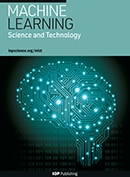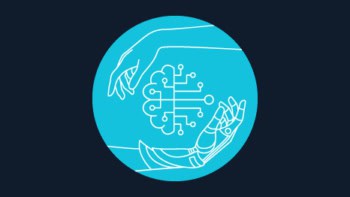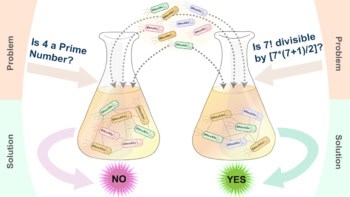Available to watch now, hear from data science and physical science experts as they share experiences and explore solutions to common barriers in FAIR and open science, as bought to you by the IOP Publishing journal Machine Learning: Science and Technology
Want to learn more on this subject?

Recently there has been a raft of exciting new initiatives in FAIR and OS. This panel aims to draw on these developments. Among the topics we will address are:
- What tools and practices have been working well in your experience?
- What are the barriers presented by current publishing models to FAIR and OS?
- What infrastructure can publishers provide to facilitate FAIR and OS?
- How can we reduce blocks in interaction between data science and domain expert communities?
Want to learn more on this subject?

Keith Butler (chair) Keith Butler’s research interests are focused on using data-driven methods and atomistic modelling to accelerate the design, development and characterization of new green energy materials. Keith is currently senior lecturer at Queen Mary University of London and was previously senior scientist at the Rutherford Appleton Laboratory in the SciML team. Keith has published more than 100 peer-reviewed research articles related to computational materials science, covering topics such as atomistic modelling of materials, machine learning enabled materials design, and machine learning for the accelerated analysis of experimental materials data. He has been involved in developing ML methods to accelerate materials characterization, developing approaches to enhance neutron scattering, X-ray tomography and electron microscopy. His work on ML for X-ray tomography has been commercialized by Finden Ltd.
Kyle Cranmer is director of the American Family Insurance Data Science Institute, University of Wisconsin–Madison and the editor in chief of IOP Publishing’s journal Machine Learning Science and Technology. Professor Cranmer obtained his PhD in physics from the University of Wisconsin-Madison in 2005 and his BA in mathematics and physics from Rice University. He was awarded the Presidential Early Career Award for Science and Engineering in 2007, the National Science Foundation’s Career Award in 2009, and became a fellow of the American Physical Society in 2021 for his work at the Large Hadron Collider. Kyle developed a framework that enables collaborative statistical modelling, which was used extensively for the discovery of the Higgs boson in 2012. His current interests are at the intersection of physics, statistics, and machine learning.
Sünje Dallmeier-Tiessen is the data coordinator in the Scientific Information Service at CERN. Together with her colleagues she builds services to enable researchers to practice open science and to take steps towards reproducible research. She holds a PhD in information science. Her previous positions in publishing and research management made her realize the need to integrate open science “workflows” into scholarly communication and management to incentivize it. Hence, she co-chaired the RDA Data Publishing Workflows group, and serves on several boards of national and international bodies. This work, together with a research stay at IQSS at Harvard University in 2015, enabled her to study data publishing practices beyond disciplinary boundaries.
James A Warren is the director of the Materials Genome Program in the Material Measurement Laboratory of the National Institute of Standards and Technology (NIST). After receiving his PhD in theoretical physics at the University of California, Santa Barbara, which was preceded by an AB (also in physics) from Dartmouth College, in 1992 he took a position as a National Research Council postdoc in the Metallurgy Division at NIST. In 1995, with three other junior NIST staff members, he co-founded the NIST Center for Theoretical and Computational Materials Science, which he has directed since 2001.
Megan Ansdell is a program officer at the Planetary Science Division at NASA. She is a space scientist with a background in international policy who is dedicated to combining her expertise in these fields to foster open science for the advancement of human knowledge. Megan currently works at NASA Headquarters in Washington, DC, where she supports NASA’s Open Source Science Initiative with a focus on growing the application of Artificial Intelligence and other data-driven approaches to the space sciences. She also manages the Planetary Data System, NASA’s long-term archive for all data returned from its planetary science missions. Prior to NASA, Megan was a research fellow at the Flatiron Institute in New York City, where she contributed to the Institute’s goal of advancing scientific research through computational methods. Megan’s PhD thesis from the University of Hawaii on the first demographic studies of protoplanetary disks in nearby star-forming regions won the International Astronomical Union’s PhD Prize for Planetary Systems and Bioastronomy. Megan also holds a Master’s degree in International Science and Technology Policy from the George Washington University, where she researched and advocated for international cooperation in human space exploration.
Harry Enke, is head of Section EScience & SuperComputing at Leibniz Institute for Astrophysics Potsdam (AIP). Starting with the German Astrophysical Virtual Observatory (GAVO) project (2003), Harry has ever since focused on integrating advanced developments of IT infrastructures and tools of astronomical research. The definition and implementation of workflows for managing the scientific data including FAIR data publication is a firmly established part of the AIP profile. The section has developed data-management infrastructure and software, publishes huge data collections and provides efficient collaborative research environments. He is involved in interdisciplinary projects for Research Data Management and developing collaborative scientific infrastructure.
Daniel Keirs is the head of journal strategy and performance at IOP Publishing. Daniel supports the provision of strategic planning and business insights on the journals publishing programme at IOP Publishing, with a particular focus on open science publishing and policy developments. Prior to joining IOP, Daniel held roles managing publishing programmes in the natural, applied and social sciences at a number of publishers, including Wiley, ICE Publishing and Taylor & Francis. Daniel has been involved in open access publishing since 2012, and at IOP has become a keen supporter of open science developments in the physical sciences.
Machine Learning: Science and Technology is a multidisciplinary open access journal that bridges the application of machine learning across the sciences with advances in machine learning methods and theory as motivated by physical insights.
Editor-in-chief: Kyle Cranmer, University of Wisconsin-Madison, USA




